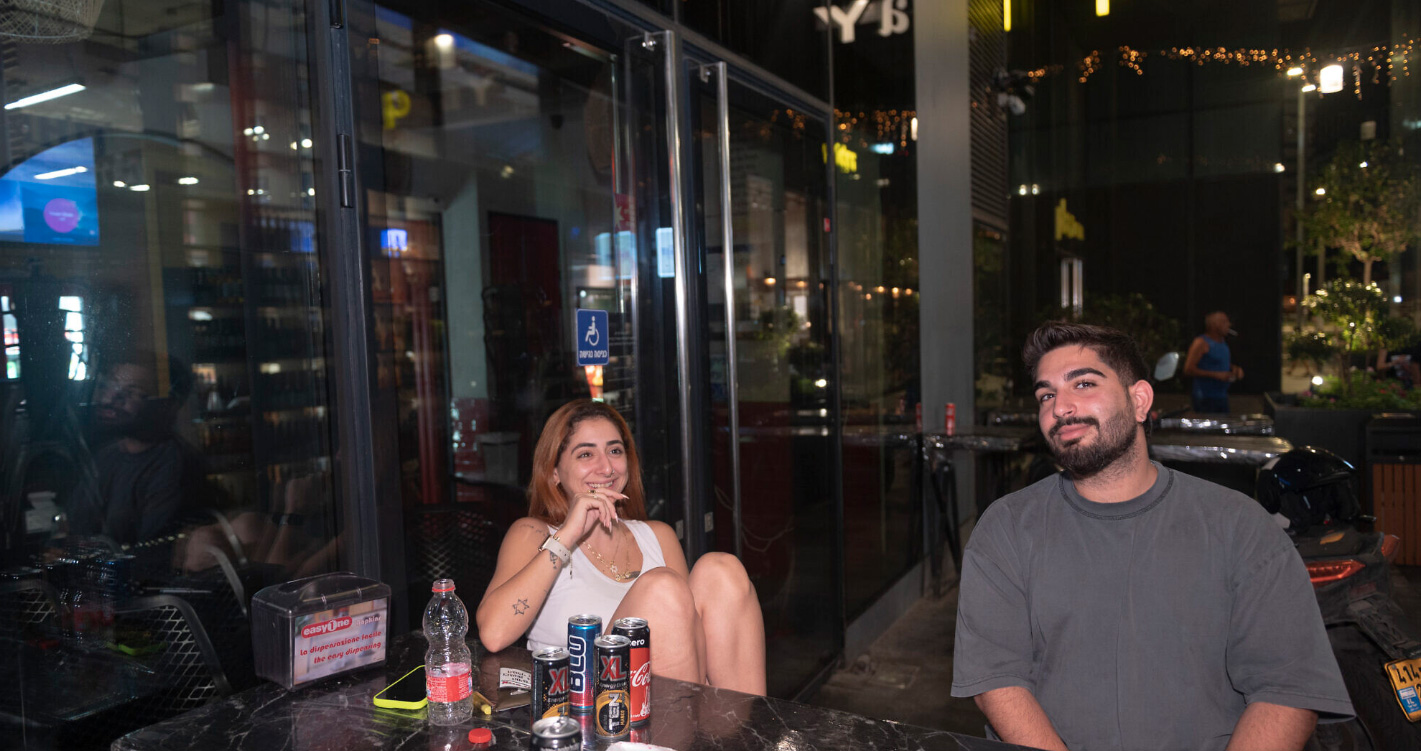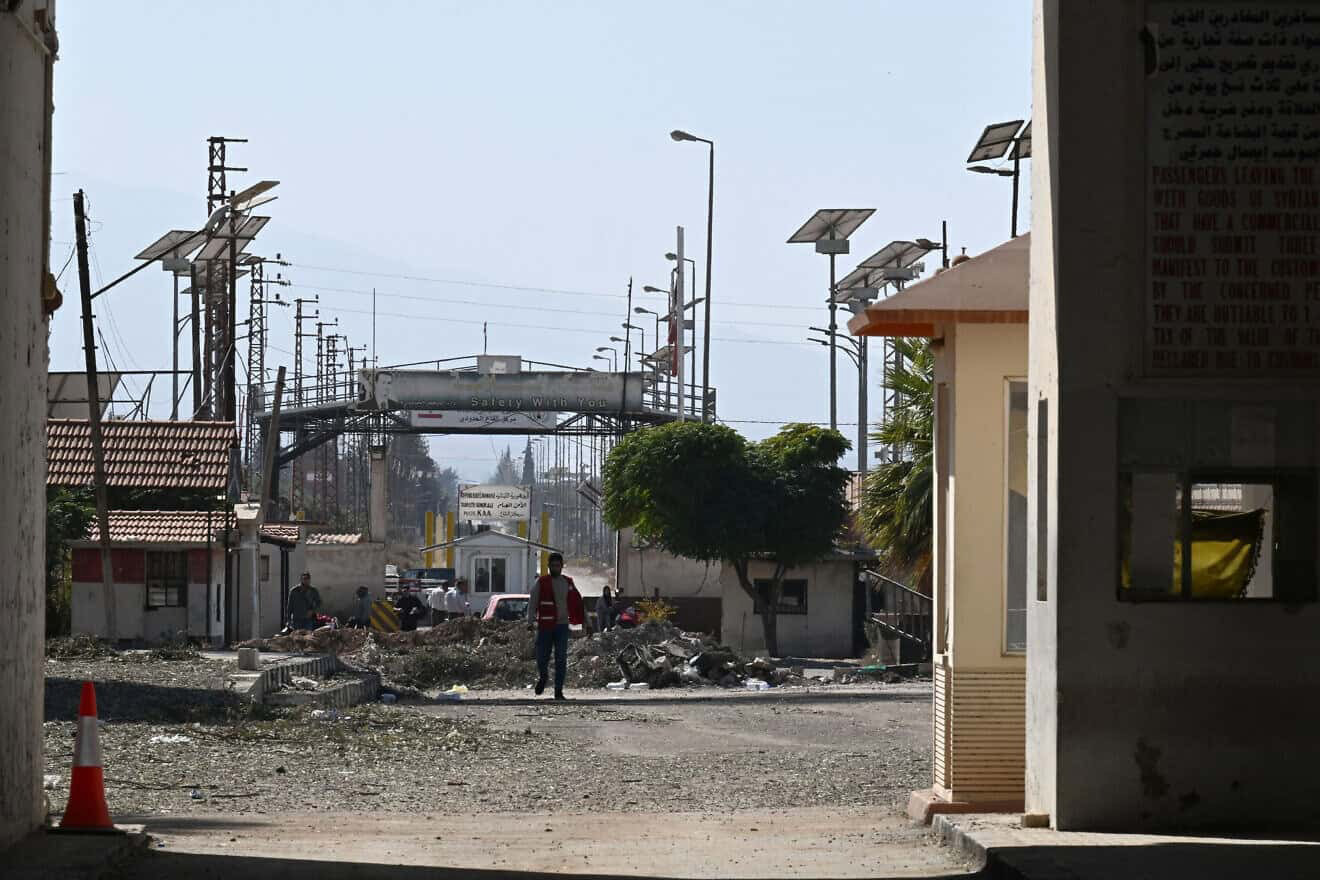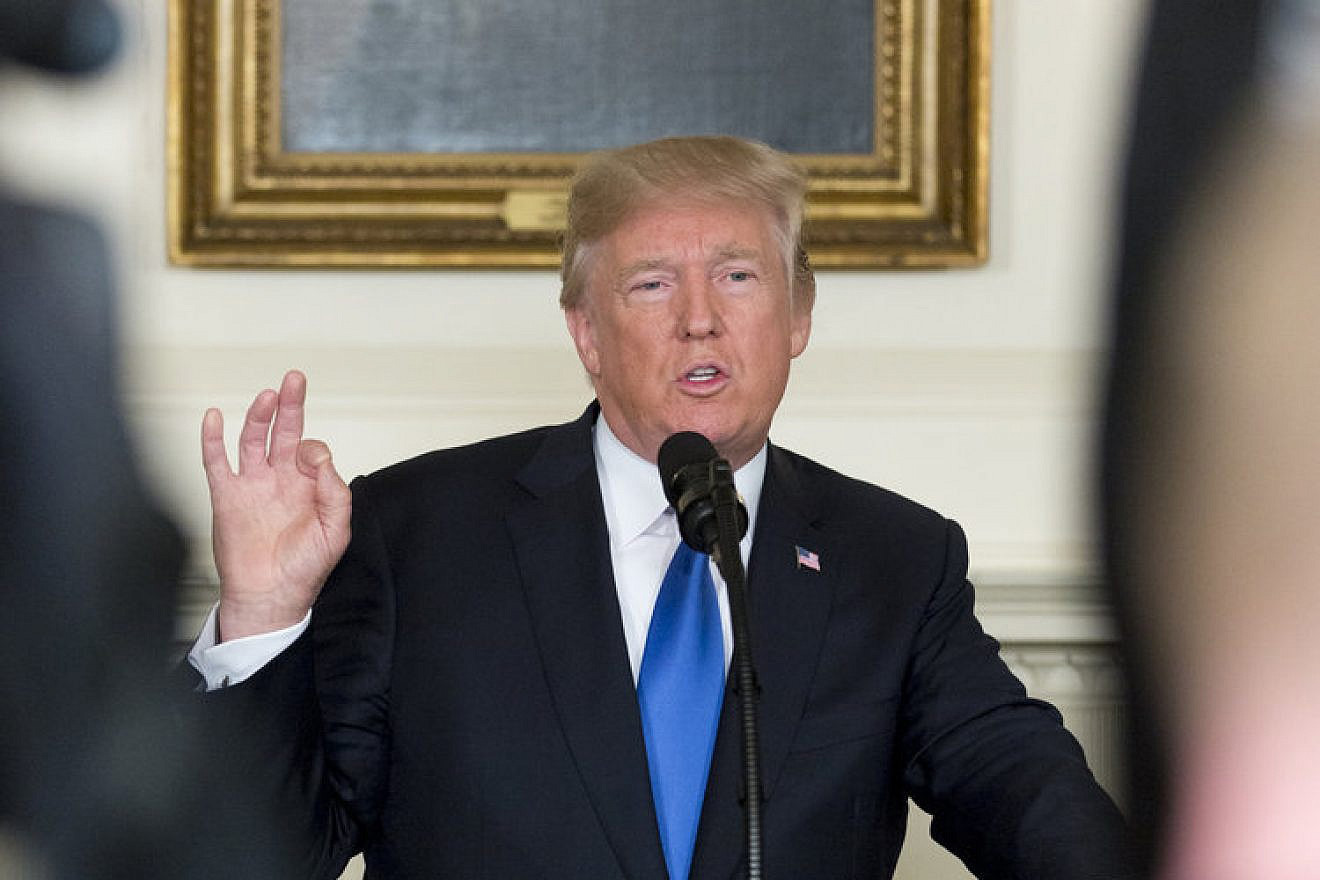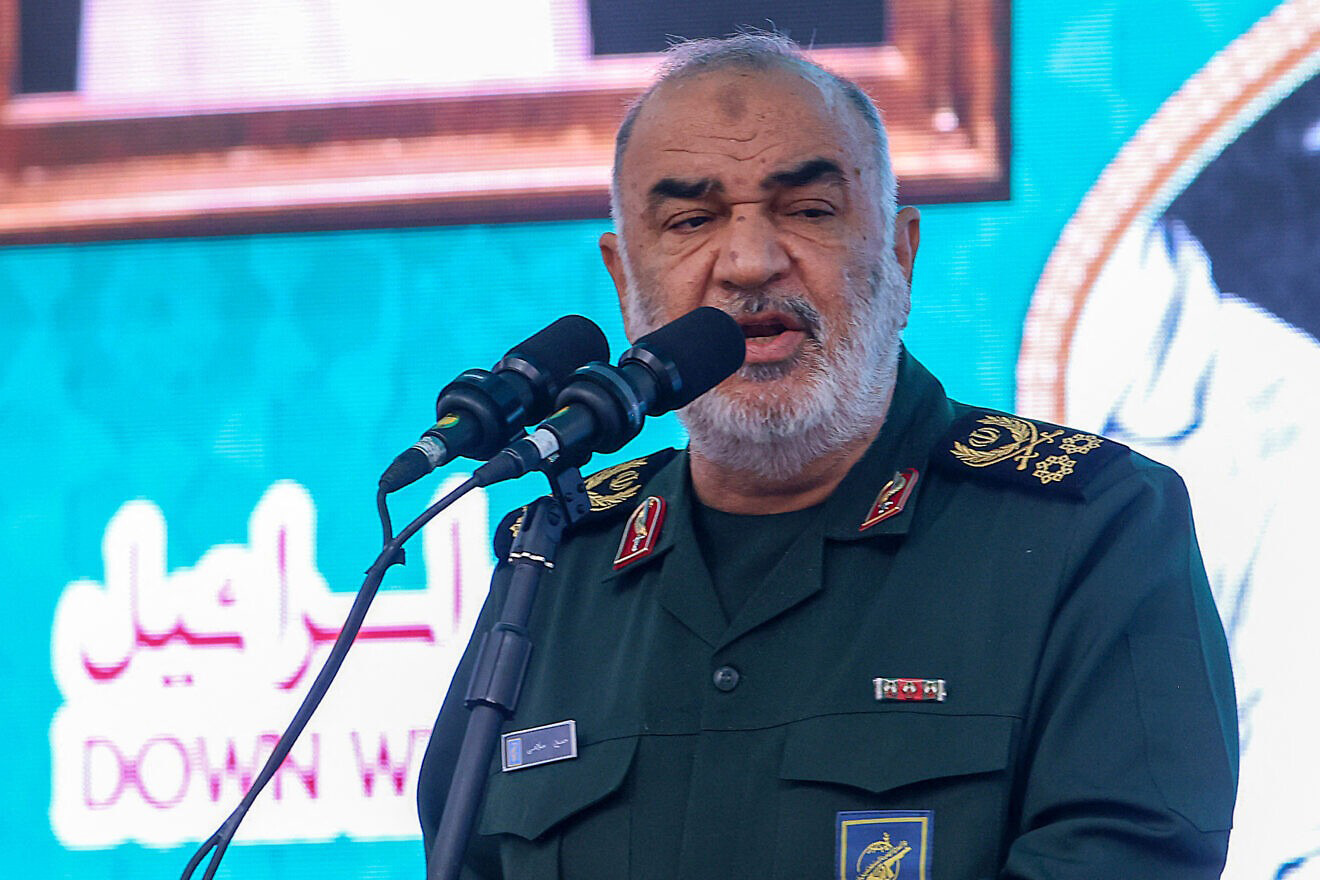Courtesy of JNS. Photo credit: Canaan Lidor
Noam Swissa (left) and Asif Korliker sit outside their hotel in Tel Aviv on Sept. 7, 2024
(JNS) — The Golda ice cream parlor near Tel Aviv’s Kaplan Street is packed on Saturday nights with anti-government protesters seeking pricey scoops and respite from the humid heat.
They belong to a movement that for months has gathered here each weekend in their thousands for fiery rallies. At Golda, protesters briefly put down placards articulating varied and sometimes conflicting demands — including for an immediate stop in the war on Hezbollah and Hamas alongside other signs demanding tougher action on both.
Unbeknownst to most protesters, they do not have the place to themselves.
The ice cream shop stands across from a hotel that houses dozens of evacuees from Kiryat Shmona, a stronghold of the ruling Likud Party of Prime Minister Benjamin Netanyahu and the largest of dozens of northern locales that were evacuated in October due to Hezbollah rocket fire.
It’s a “generally disturbing scene,” Asif Korliker, a 24-year-old evacuee, told JNS last week about the fanfare outside the Play Hotel overlooking Golda. “But those presuming to represent us northerners irk me the most.
“Our lives are on hold so we can win the war and return safely while they’re sabotaging the war to send us back to live in Hezbollah’s crosshairs,” Korliker said of the protests.
He spoke calmly while smoking with three other evacuees around a table outside the hotel’s lobby.
The space between the Golda and the Play Hotel is a microcosm of how Israel’s war is deepening an unhealing societal rift. It separates Sephardic conservatives who hail from Israel’s vulnerable and impoverished peripheries from a heavily Ashkenazi demographic in central cities with more affluent and left-leaning populations.
Another refugee from Kiryat Shmona, Noam Swissa, 21, noted that, beyond politics, “The protests are incredibly noisy. The megaphones, the drums, the screams. It’s a huge disturbance each weekend.”
Three women eating ice cream, their placards tucked under their arms, intervened. “How about this, do you find this disturbing?” one of them asked the evacuees, holding up a poster of one of the hostages. “We’re out here helping him. What are you doing to help him?”
A debate, one of countless such exchanges that Israelis have been having for the past 11 months, ensued. The right-wing conservatives told the protesters that their actions were only hampering chances for the hostages’ release by driving up Hamas’s asking price for their release and “creating civil unrest during wartime,” as Korliker put it.
Allegations of creating divisions were exchanged, followed by attacks and defenses of Netanyahu.
“He doesn’t care about you, you’re his last priority,” one of the protesters said.
“The same goes for you, fortunately. He’s taking care of business regardless of your senseless protests,” Swissa retorted. “You might as well go back home to Kfar Saba,” she added, naming an affluent suburb of Tel Aviv. “Our homes have probably been destroyed, but that’s okay with us as long as it will lead to victory and survival.”
Another evacuee emerges from the hotel. “Why don’t you just finish your ice cream and go, your Saturday night out is over anyway. Hope it was fun!”
One of the protesters raises her voice, telling the evacuees that all three women are physicians “who kill themselves each week to do something about the hostages, about your situation, about the terrible situation of Gazans, who are also human and are also suffering.”
In an interview with JNS after the exchange, that protester said she believed that Israel’s bombings in Gaza against Hamas targets “are raising a new generation of Palestinians to hate Israelis.” Her friends nodded vigorously in agreement.
She also repeated an oft-heard slogan at the demonstrations that the Netanyahu government has “abandoned the north to burn,” adding, “We’re here to fight for the evacuees too but they’re too ignorant and brainwashed to see it.”
The three protesters moved away as they exchanged shouts with the refugees. The rhetoric was heated but neither party descended to profanities.
“This sort of thing happens regularly here on Saturday nights,” Korliker said. “I’d say there are five incidents like this each major protest.”
In June, demonstrators accosted another evacuee from Kiryat Shmona, Hevron Sofer, as he was returning through the protest from a synagogue near the Azrieli Center skyscraper complex while wearing a tzitzit, the knotted fringes worn by religious Jews.
A woman sitting on a bench shouted at Sofer, a combat soldier in the reserves: “Go serve in the army, you parasite.”
Speaking to a reporter, he said, “The harassment I can live with. The bigger problem is that their actions could mean that in a few years, it will be my home in Kiryat Shmona that’s overrun by terrorists.”
Like Sofer, a security guard, Korliker has been living at Play Hotel since early October, when he and about 60,000 other evacuees were given state-paid accommodations indefinitely as Hezbollah began firing rockets into Israel’s north in solidarity with Hamas, whose terrorists on Oct. 7 murdered some 1,200 people in Israel and abducted another 251, initiating a still-ongoing regional war.
Neither he nor Swissa has been back to Kiryat Shmona, a sleepy border town that before the war was only beginning to emerge from decades of demographic stagnation and slowly close the 20% gap in the income of its residents compared to the national average. “We miss it every day and every second,” said Swissa, who worked at a liquor store back in Kiryat Shmona.
Living in small hotel rooms for nearly a year isn’t very convenient, “but it’s nothing compared to the sacrifices of the troops, the hundreds of soldiers we’ve lost,” Korliker said. “If we stop fighting with Hamas and Hezbollah still standing, how can we explain to their mothers what their sons and daughters died for?”
Sofer is among a handful of evacuees and other right-wingers who on some weekends stage a small counterprotest near the anti-government one on Kaplan Street. They stand for hours shouting at the anti-government protests. Most other evacuees, including Korliker and Swissa, stay away.
“Yes, it’s infuriating,” Korliker said of the protests. “But if we go out to the street to start an internal fight during wartime, how are we any different?”





